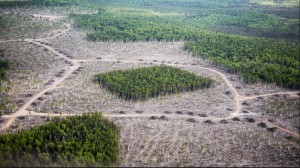The term refers to the break-up a larger continuous habitat into smaller discrete “patches” of landscape that become isolated from the previous habitat. The break-up results in a loss of continuity in the habitat; a loss of feeding grounds for various species, some of which are unable to travel to reach larger patches or habitats; and a loss of plantlife. The biodiversity of the habitat is threatened and is often weakened or even destroyed. The smaller the habitat becomes, the more its inhabitants become vulnerable to small changes in climate, resources and other conditions.
Audubon Society
Certain natural events such as glacial advances, volcanic activity, and major sea level rise have led to fragmentation. But since the current Holocene era, human activity has quickly and extensively transformed the landscape and caused large scale fragmentation. One of the largest that has existed for two millennia is the Great Wall of China, and massive deforestation in the Amazon and elsewhere are comparable. On a smaller scale, many highways cut through what were continuous habitats creating fragmentation, as do agriculture and hydroelectric dams. When a highway disrupts a habitat even those species that can travel are now subjected to the risks of having to cross a road.
Some further ideas to explore on Habitat Fragmentation
Identify a habitat in your area that has been fragmented during your lifetime.
Determine what caused the fragmentation.
Assess what impacts on the habitat’s ecosystem occurred as a result of the fragmentation.
Determine if there is any way to reconnect the fragmented habitat.
Sources
See “Habitats” in the iePEDIA section of irish environment (1 July 2011). www.irishenvironment.com/iepedia/habitats/
C. Michael Hogan, “Habitat Fragmentation,” The Encyclopedia of Earth www.eoearth.org/view/article/153225/
Raphael K. Didham, “Ecological Consequences of Habitat Fragnmentation,” Wiley Citable reviews in the life sciences (November 2010). www.els.net/WileyCDA/ElsArticle/refId-a0021904.html



No comments yet, add your own below